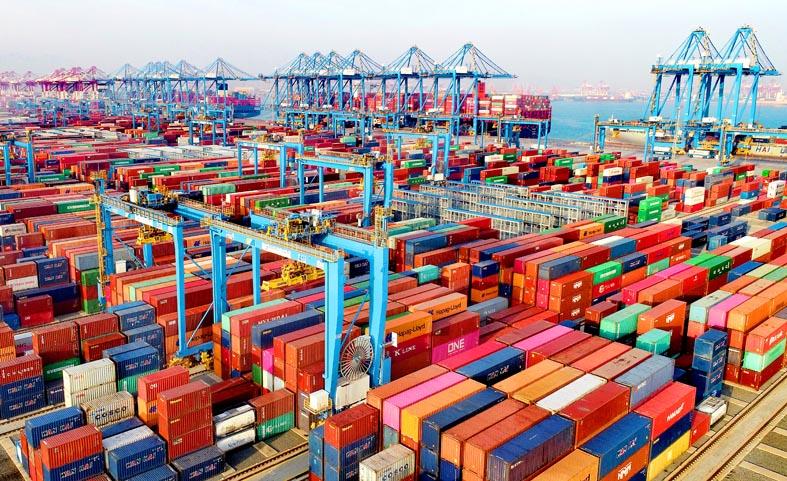China’s politically sensitive trade surplus with the US last month soared to a record US$75.4 billion as exports surged 21.1 percent from a year earlier, propelled by US consumer demand.
Exports to the US rose 46 percent, despite lingering tariff hikes in a trade dispute with Washington, customs data showed yesterday.
Total exports rose to US$268 billion, accelerating from October’s 11.4 percent growth. Imports gained 5 percent to US$192.6 billion, up from the previous month’s 4.7 percent.

Photo: EPA-EFE
Chinese exporters have benefited from the economy’s relatively early reopening after the Chinese Communist Party in March declared the country’s COVID-19 outbreak under control, while foreign competitors still are hampered by anti-disease controls.
“Exports were much stronger than expected in November,” Julian Evans-Pritchard of Capital Economics Ltd said in a report.
Forecasters have said that the surge is unlikely to last into next year once COVID-19 vaccines are rolled out.
“We expect export performance to be less impressive,” Louis Kuijs of Oxford Economics Ltd said in a report.
China’s global trade surplus for the first 11 months of this year reached US$460 billion, up 21.4 percent from a year earlier, already one of the highest ever recorded.
Exports to the US rose to US$51.9 billion, while imports of US goods gained 33 percent to US$14.6 billion.
The trade surplus with the US swelled 52 percent from a year earlier to US$37.3 billion.
Beijing promised to buy more US soybeans, natural gas and other exports as part of the “phase one” trade agreement signed in January and aimed at ending a costly tariff battle over Chinese technology ambitions.
China fell behind on meeting those commitments earlier in the year, but is catching up as demand rebounds.
The two governments agreed to postpone further planned tariff hikes on each other’s goods, but most penalties already imposed on billions of dollars of imports stayed in place.
Chinese imports are growing faster by volume than by value, because demand has been chilled by the shutdown of travel and industry, driving prices lower.
China’s exports to the 27-nation EU last month rose 8.6 percent from a year earlier to US$37.5 billion, while imports of European goods gained 4.5 percent to US$26.2 billion.
Its trade surplus with Europe widened by 20 percent to US$11.3 billion.

Taiwan Transport and Storage Corp (TTS, 台灣通運倉儲) yesterday unveiled its first electric tractor unit — manufactured by Volvo Trucks — in a ceremony in Taipei, and said the unit would soon be used to transport cement produced by Taiwan Cement Corp (TCC, 台灣水泥). Both TTS and TCC belong to TCC International Holdings Ltd (台泥國際集團). With the electric tractor unit, the Taipei-based cement firm would become the first in Taiwan to use electric vehicles to transport construction materials. TTS chairman Koo Kung-yi (辜公怡), Volvo Trucks vice president of sales and marketing Johan Selven, TCC president Roman Cheng (程耀輝) and Taikoo Motors Group

Among the rows of vibrators, rubber torsos and leather harnesses at a Chinese sex toys exhibition in Shanghai this weekend, the beginnings of an artificial intelligence (AI)-driven shift in the industry quietly pulsed. China manufactures about 70 percent of the world’s sex toys, most of it the “hardware” on display at the fair — whether that be technicolor tentacled dildos or hyper-realistic personalized silicone dolls. Yet smart toys have been rising in popularity for some time. Many major European and US brands already offer tech-enhanced products that can enable long-distance love, monitor well-being and even bring people one step closer to

RECORD-BREAKING: TSMC’s net profit last quarter beat market expectations by expanding 8.9% and it was the best first-quarter profit in the chipmaker’s history Taiwan Semiconductor Manufacturing Co (TSMC, 台積電), which counts Nvidia Corp as a key customer, yesterday said that artificial intelligence (AI) server chip revenue is set to more than double this year from last year amid rising demand. The chipmaker expects the growth momentum to continue in the next five years with an annual compound growth rate of 50 percent, TSMC chief executive officer C.C. Wei (魏哲家) told investors yesterday. By 2028, AI chips’ contribution to revenue would climb to about 20 percent from a percentage in the low teens, Wei said. “Almost all the AI innovators are working with TSMC to address the

Malaysia’s leader yesterday announced plans to build a massive semiconductor design park, aiming to boost the Southeast Asian nation’s role in the global chip industry. A prominent player in the semiconductor industry for decades, Malaysia accounts for an estimated 13 percent of global back-end manufacturing, according to German tech giant Bosch. Now it wants to go beyond production and emerge as a chip design powerhouse too, Malaysian Prime Minister Anwar Ibrahim said. “I am pleased to announce the largest IC (integrated circuit) Design Park in Southeast Asia, that will house world-class anchor tenants and collaborate with global companies such as Arm [Holdings PLC],”